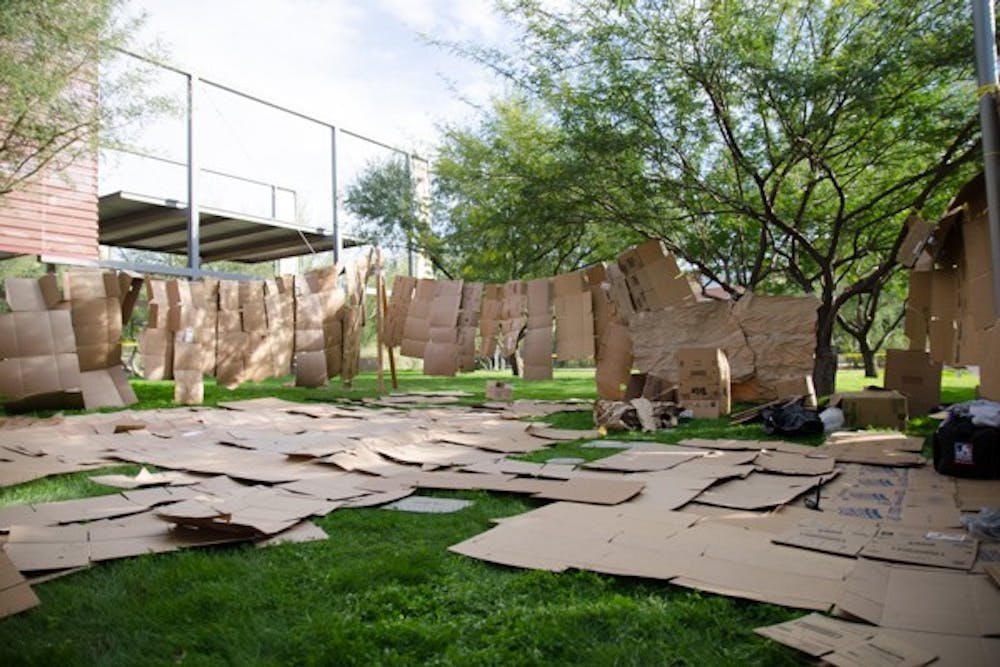 A sign from the fall 2013 Polytechnic $2 challenge hangs near the entrance where students would sleep. (Photo by Andrew Ybanez)
A sign from the fall 2013 Polytechnic $2 challenge hangs near the entrance where students would sleep. (Photo by Andrew Ybanez)
More than 40 ASU students from the West and Polytechnic campuses will experience the absence of modern-day luxuries by living on $2 a day in cardboard boxes for five days starting on April 7.
The Two Dollar Challenge is a nationwide experiment that challenges students to step out of their daily lives and reflect on the struggles people who live in poverty experience every day.
Esperança, a nonprofit organization that improves health and helps families in the poorest communities of the world, helped sponsor the event.
Esperança’s goal is to build clean, sustainable and healthy communities worldwide.
President & CEO of Esperança Tom Egan said not everyone has the chance to travel to developing nations and witness first-hand the reality of poverty.
“We have guided discussions so it’s a learning experience,” he said. “So they can understand the effect of poverty around the world.”
The challenge has students live by rules designed to simulate poverty. It provides students with a glimpse of how a significant part of the world’s population is forced to live their daily lives.
Through the experience and comprehensive discussions, students are educated about the complexity of world poverty.
Challenge participants will also raise funds for any cause of their choice. Shawn Humphrey, founder of The Two Dollar Challenge, will also be at ASU during the event.
Egan said students realize quickly that if they pull their money and resources, their limited income goes a lot further.
“They get really resourceful,” he said. “If people work together, they realize they can get more bang for their buck.”
Egan said although living on campus isn’t the same as living in a developing country, they do follow some of the same rules.
“They have to build a shelter out of cardboard and they do their schoolwork from natural light,” he said. “They are really trying to live the basics."
 Carboard boxes line the area near the union at the Polytechnic campus where students would sleep during the 2013 Polytechnic $2 challenge. (Photo by Andrew Ybanez)
Carboard boxes line the area near the union at the Polytechnic campus where students would sleep during the 2013 Polytechnic $2 challenge. (Photo by Andrew Ybanez)
Not everyone is able to make it all five nights, while others persevere. Egan said he once talked to a young man who almost quit but didn’t when he remembered people actually had to live in poverty.
“He told me, ‘They can’t just stop pretending,’” Egan said.
Psychology junior Hannah Syfritt will be participating in the challenge in April. She said she thought it was a great promotion to end world hunger.
“I think it really allows you to have more compassion for people in the situation they are in,” she said. “It really could be any of us. You can’t stereotype and make excuses for people.”
Psychology junior Melina Almada Encinas will be planning the challenge for the West campus. She said her role will be getting everyone together and make them feel comfortable.
“I will be there every single moment I can,” she said. “I want to make sure they all get the right experience.”
Electrical engineering senior Mentor Dida is the organizer for the Polytechnic campus. This will be his third year participating in the challenge.
He said it was difficult at first to organize everything but every year, more and more people have shown up.
“There has been a lot more fundraising and support from ASU,” he said. “We have a professional photographer who will be participating with us and a set of new rules.”
Although very dedicated to honoring the rules of the challenge, Dida said there was one incident where he almost quit.
“Last semester during the challenge, the first night the sprinklers went off and all the cardboard was wet,” he said. “We were facing a problem, because we didn’t have a place to sleep. Either we sleep on concrete or go home.”
Dida decided to sleep on concrete that night because homeless people don’t have the option to go home and quit.
Reach the reporter at kgrega@asu.edu or follow her on twitter @kelciegrega




